IT Innovation for Improved Logistics and Supply Chain Management
VerifiedAdded on 2023/06/14
|9
|2001
|382
Report
AI Summary
This research proposal outlines a study to investigate the implication of IT innovation on logistics and supply chain management within global operations, focusing on a case study of Sainsbury. The proposal includes an introduction highlighting the importance of logistics and supply chain management in the global economy, particularly with the rise of digitalization. The research aims to study the concept of logistics and supply chain management, examine IT innovations adopted by Sainsbury, analyze the impact of these innovations, and suggest further IT innovations for improvement. The rationale emphasizes the need for digital technology in logistics to enhance efficiency and online tracking. The literature review discusses the differences between logistics and supply chain management, highlighting the role of IT integration in improving tracking and reducing information delays. The methodology section details the research type (qualitative), approach (inductive), philosophy (interpretivism), data collection methods (primary and secondary), sampling technique (simple random sampling), data analysis method (thematic analysis), ethical considerations, and measures for ensuring reliability and validity. A timeline is provided for the research activities, followed by a list of references.

RESEARCH PROPOSAL
Paraphrase This Document
Need a fresh take? Get an instant paraphrase of this document with our AI Paraphraser
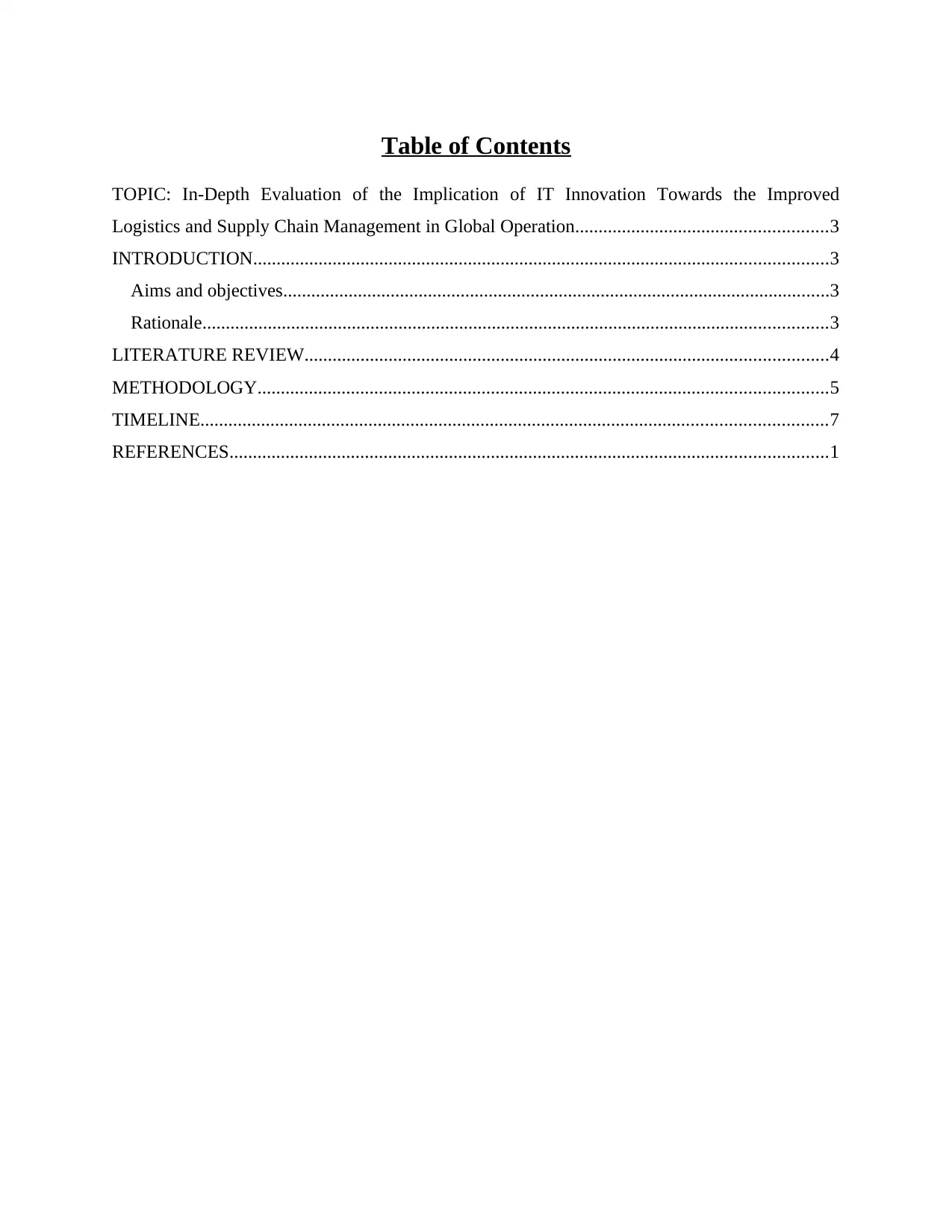
Table of Contents
TOPIC: In-Depth Evaluation of the Implication of IT Innovation Towards the Improved
Logistics and Supply Chain Management in Global Operation......................................................3
INTRODUCTION...........................................................................................................................3
Aims and objectives.....................................................................................................................3
Rationale......................................................................................................................................3
LITERATURE REVIEW................................................................................................................4
METHODOLOGY..........................................................................................................................5
TIMELINE......................................................................................................................................7
REFERENCES................................................................................................................................1
TOPIC: In-Depth Evaluation of the Implication of IT Innovation Towards the Improved
Logistics and Supply Chain Management in Global Operation......................................................3
INTRODUCTION...........................................................................................................................3
Aims and objectives.....................................................................................................................3
Rationale......................................................................................................................................3
LITERATURE REVIEW................................................................................................................4
METHODOLOGY..........................................................................................................................5
TIMELINE......................................................................................................................................7
REFERENCES................................................................................................................................1
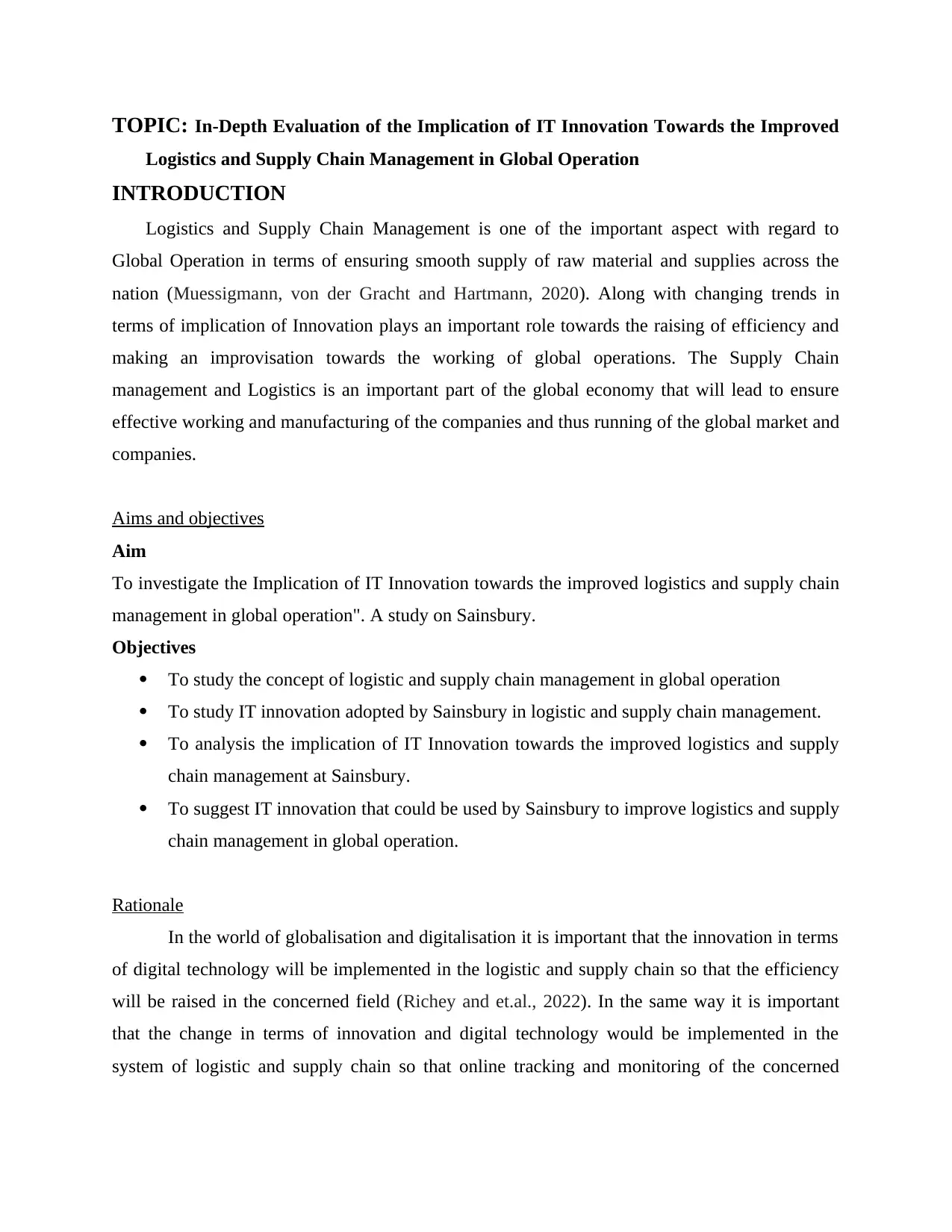
TOPIC: In-Depth Evaluation of the Implication of IT Innovation Towards the Improved
Logistics and Supply Chain Management in Global Operation
INTRODUCTION
Logistics and Supply Chain Management is one of the important aspect with regard to
Global Operation in terms of ensuring smooth supply of raw material and supplies across the
nation (Muessigmann, von der Gracht and Hartmann, 2020). Along with changing trends in
terms of implication of Innovation plays an important role towards the raising of efficiency and
making an improvisation towards the working of global operations. The Supply Chain
management and Logistics is an important part of the global economy that will lead to ensure
effective working and manufacturing of the companies and thus running of the global market and
companies.
Aims and objectives
Aim
To investigate the Implication of IT Innovation towards the improved logistics and supply chain
management in global operation". A study on Sainsbury.
Objectives
To study the concept of logistic and supply chain management in global operation
To study IT innovation adopted by Sainsbury in logistic and supply chain management.
To analysis the implication of IT Innovation towards the improved logistics and supply
chain management at Sainsbury.
To suggest IT innovation that could be used by Sainsbury to improve logistics and supply
chain management in global operation.
Rationale
In the world of globalisation and digitalisation it is important that the innovation in terms
of digital technology will be implemented in the logistic and supply chain so that the efficiency
will be raised in the concerned field (Richey and et.al., 2022). In the same way it is important
that the change in terms of innovation and digital technology would be implemented in the
system of logistic and supply chain so that online tracking and monitoring of the concerned
Logistics and Supply Chain Management in Global Operation
INTRODUCTION
Logistics and Supply Chain Management is one of the important aspect with regard to
Global Operation in terms of ensuring smooth supply of raw material and supplies across the
nation (Muessigmann, von der Gracht and Hartmann, 2020). Along with changing trends in
terms of implication of Innovation plays an important role towards the raising of efficiency and
making an improvisation towards the working of global operations. The Supply Chain
management and Logistics is an important part of the global economy that will lead to ensure
effective working and manufacturing of the companies and thus running of the global market and
companies.
Aims and objectives
Aim
To investigate the Implication of IT Innovation towards the improved logistics and supply chain
management in global operation". A study on Sainsbury.
Objectives
To study the concept of logistic and supply chain management in global operation
To study IT innovation adopted by Sainsbury in logistic and supply chain management.
To analysis the implication of IT Innovation towards the improved logistics and supply
chain management at Sainsbury.
To suggest IT innovation that could be used by Sainsbury to improve logistics and supply
chain management in global operation.
Rationale
In the world of globalisation and digitalisation it is important that the innovation in terms
of digital technology will be implemented in the logistic and supply chain so that the efficiency
will be raised in the concerned field (Richey and et.al., 2022). In the same way it is important
that the change in terms of innovation and digital technology would be implemented in the
system of logistic and supply chain so that online tracking and monitoring of the concerned
⊘ This is a preview!⊘
Do you want full access?
Subscribe today to unlock all pages.

Trusted by 1+ million students worldwide
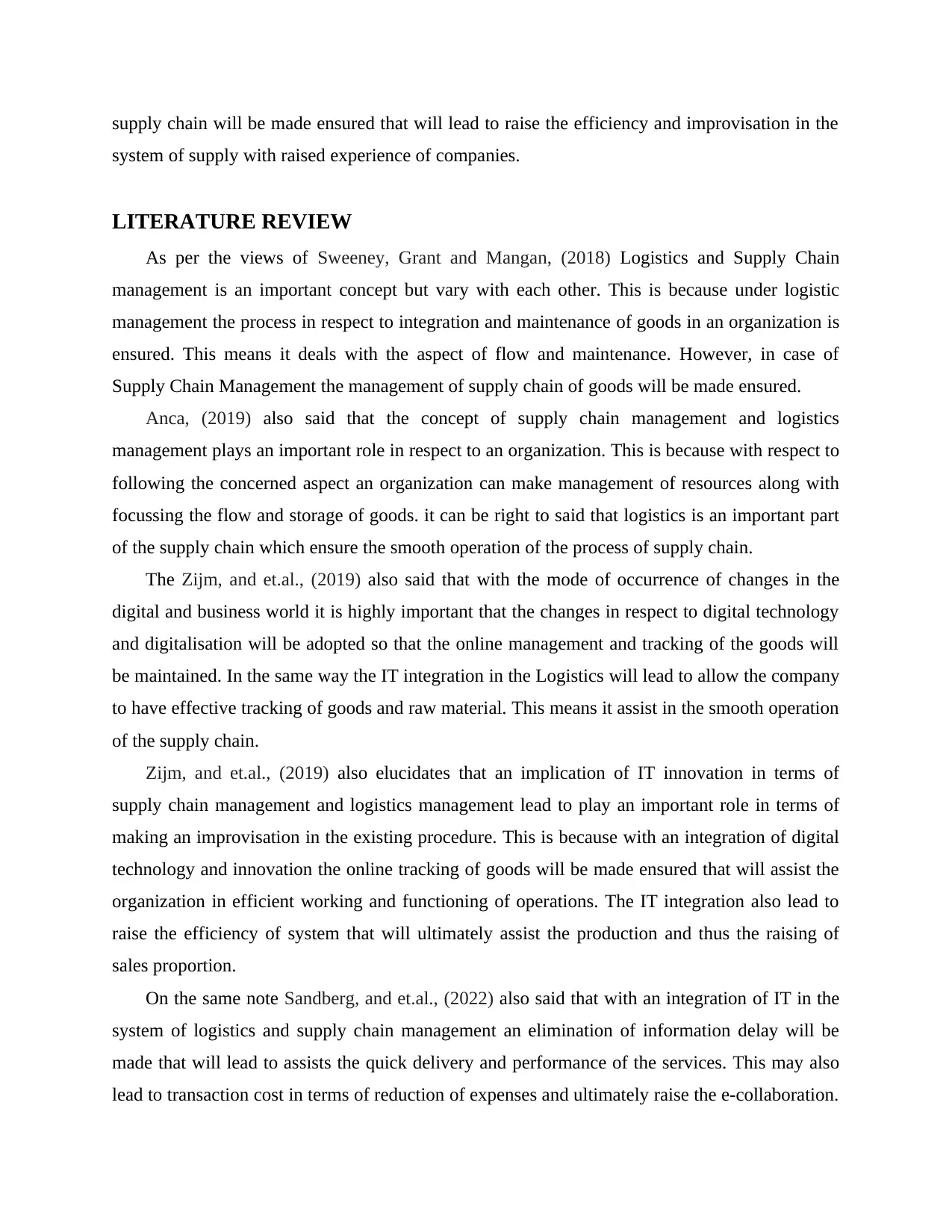
supply chain will be made ensured that will lead to raise the efficiency and improvisation in the
system of supply with raised experience of companies.
LITERATURE REVIEW
As per the views of Sweeney, Grant and Mangan, (2018) Logistics and Supply Chain
management is an important concept but vary with each other. This is because under logistic
management the process in respect to integration and maintenance of goods in an organization is
ensured. This means it deals with the aspect of flow and maintenance. However, in case of
Supply Chain Management the management of supply chain of goods will be made ensured.
Anca, (2019) also said that the concept of supply chain management and logistics
management plays an important role in respect to an organization. This is because with respect to
following the concerned aspect an organization can make management of resources along with
focussing the flow and storage of goods. it can be right to said that logistics is an important part
of the supply chain which ensure the smooth operation of the process of supply chain.
The Zijm, and et.al., (2019) also said that with the mode of occurrence of changes in the
digital and business world it is highly important that the changes in respect to digital technology
and digitalisation will be adopted so that the online management and tracking of the goods will
be maintained. In the same way the IT integration in the Logistics will lead to allow the company
to have effective tracking of goods and raw material. This means it assist in the smooth operation
of the supply chain.
Zijm, and et.al., (2019) also elucidates that an implication of IT innovation in terms of
supply chain management and logistics management lead to play an important role in terms of
making an improvisation in the existing procedure. This is because with an integration of digital
technology and innovation the online tracking of goods will be made ensured that will assist the
organization in efficient working and functioning of operations. The IT integration also lead to
raise the efficiency of system that will ultimately assist the production and thus the raising of
sales proportion.
On the same note Sandberg, and et.al., (2022) also said that with an integration of IT in the
system of logistics and supply chain management an elimination of information delay will be
made that will lead to assists the quick delivery and performance of the services. This may also
lead to transaction cost in terms of reduction of expenses and ultimately raise the e-collaboration.
system of supply with raised experience of companies.
LITERATURE REVIEW
As per the views of Sweeney, Grant and Mangan, (2018) Logistics and Supply Chain
management is an important concept but vary with each other. This is because under logistic
management the process in respect to integration and maintenance of goods in an organization is
ensured. This means it deals with the aspect of flow and maintenance. However, in case of
Supply Chain Management the management of supply chain of goods will be made ensured.
Anca, (2019) also said that the concept of supply chain management and logistics
management plays an important role in respect to an organization. This is because with respect to
following the concerned aspect an organization can make management of resources along with
focussing the flow and storage of goods. it can be right to said that logistics is an important part
of the supply chain which ensure the smooth operation of the process of supply chain.
The Zijm, and et.al., (2019) also said that with the mode of occurrence of changes in the
digital and business world it is highly important that the changes in respect to digital technology
and digitalisation will be adopted so that the online management and tracking of the goods will
be maintained. In the same way the IT integration in the Logistics will lead to allow the company
to have effective tracking of goods and raw material. This means it assist in the smooth operation
of the supply chain.
Zijm, and et.al., (2019) also elucidates that an implication of IT innovation in terms of
supply chain management and logistics management lead to play an important role in terms of
making an improvisation in the existing procedure. This is because with an integration of digital
technology and innovation the online tracking of goods will be made ensured that will assist the
organization in efficient working and functioning of operations. The IT integration also lead to
raise the efficiency of system that will ultimately assist the production and thus the raising of
sales proportion.
On the same note Sandberg, and et.al., (2022) also said that with an integration of IT in the
system of logistics and supply chain management an elimination of information delay will be
made that will lead to assists the quick delivery and performance of the services. This may also
lead to transaction cost in terms of reduction of expenses and ultimately raise the e-collaboration.
Paraphrase This Document
Need a fresh take? Get an instant paraphrase of this document with our AI Paraphraser
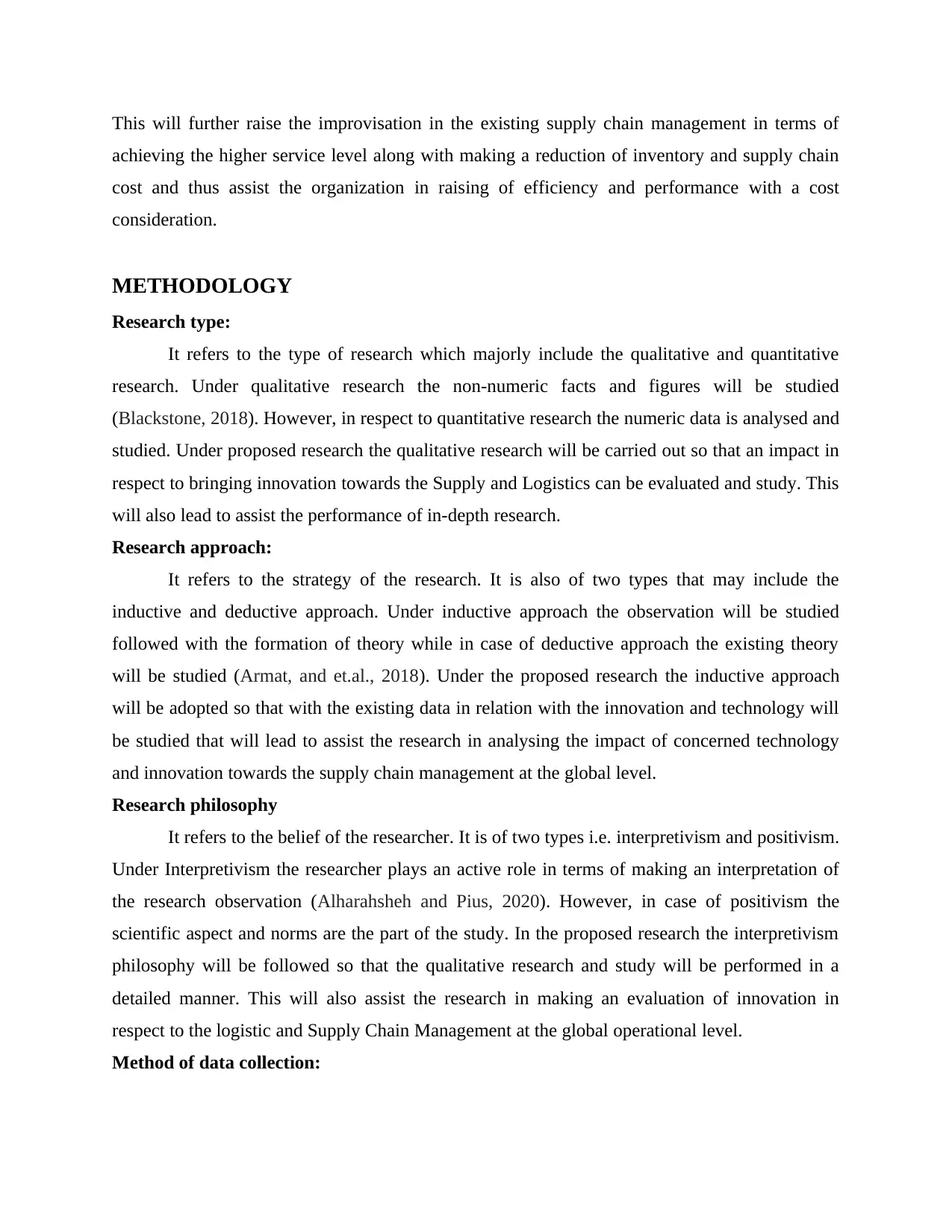
This will further raise the improvisation in the existing supply chain management in terms of
achieving the higher service level along with making a reduction of inventory and supply chain
cost and thus assist the organization in raising of efficiency and performance with a cost
consideration.
METHODOLOGY
Research type:
It refers to the type of research which majorly include the qualitative and quantitative
research. Under qualitative research the non-numeric facts and figures will be studied
(Blackstone, 2018). However, in respect to quantitative research the numeric data is analysed and
studied. Under proposed research the qualitative research will be carried out so that an impact in
respect to bringing innovation towards the Supply and Logistics can be evaluated and study. This
will also lead to assist the performance of in-depth research.
Research approach:
It refers to the strategy of the research. It is also of two types that may include the
inductive and deductive approach. Under inductive approach the observation will be studied
followed with the formation of theory while in case of deductive approach the existing theory
will be studied (Armat, and et.al., 2018). Under the proposed research the inductive approach
will be adopted so that with the existing data in relation with the innovation and technology will
be studied that will lead to assist the research in analysing the impact of concerned technology
and innovation towards the supply chain management at the global level.
Research philosophy
It refers to the belief of the researcher. It is of two types i.e. interpretivism and positivism.
Under Interpretivism the researcher plays an active role in terms of making an interpretation of
the research observation (Alharahsheh and Pius, 2020). However, in case of positivism the
scientific aspect and norms are the part of the study. In the proposed research the interpretivism
philosophy will be followed so that the qualitative research and study will be performed in a
detailed manner. This will also assist the research in making an evaluation of innovation in
respect to the logistic and Supply Chain Management at the global operational level.
Method of data collection:
achieving the higher service level along with making a reduction of inventory and supply chain
cost and thus assist the organization in raising of efficiency and performance with a cost
consideration.
METHODOLOGY
Research type:
It refers to the type of research which majorly include the qualitative and quantitative
research. Under qualitative research the non-numeric facts and figures will be studied
(Blackstone, 2018). However, in respect to quantitative research the numeric data is analysed and
studied. Under proposed research the qualitative research will be carried out so that an impact in
respect to bringing innovation towards the Supply and Logistics can be evaluated and study. This
will also lead to assist the performance of in-depth research.
Research approach:
It refers to the strategy of the research. It is also of two types that may include the
inductive and deductive approach. Under inductive approach the observation will be studied
followed with the formation of theory while in case of deductive approach the existing theory
will be studied (Armat, and et.al., 2018). Under the proposed research the inductive approach
will be adopted so that with the existing data in relation with the innovation and technology will
be studied that will lead to assist the research in analysing the impact of concerned technology
and innovation towards the supply chain management at the global level.
Research philosophy
It refers to the belief of the researcher. It is of two types i.e. interpretivism and positivism.
Under Interpretivism the researcher plays an active role in terms of making an interpretation of
the research observation (Alharahsheh and Pius, 2020). However, in case of positivism the
scientific aspect and norms are the part of the study. In the proposed research the interpretivism
philosophy will be followed so that the qualitative research and study will be performed in a
detailed manner. This will also assist the research in making an evaluation of innovation in
respect to the logistic and Supply Chain Management at the global operational level.
Method of data collection:
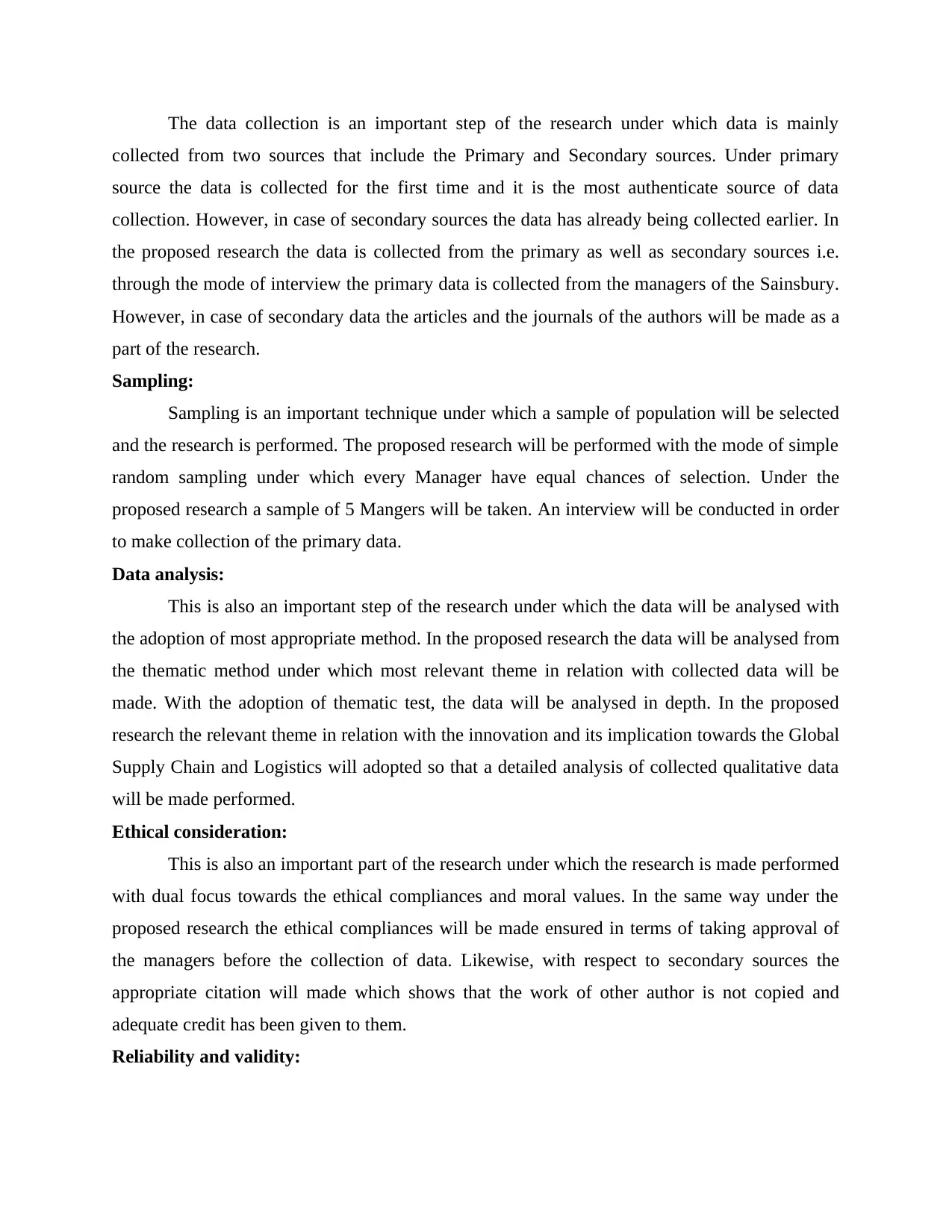
The data collection is an important step of the research under which data is mainly
collected from two sources that include the Primary and Secondary sources. Under primary
source the data is collected for the first time and it is the most authenticate source of data
collection. However, in case of secondary sources the data has already being collected earlier. In
the proposed research the data is collected from the primary as well as secondary sources i.e.
through the mode of interview the primary data is collected from the managers of the Sainsbury.
However, in case of secondary data the articles and the journals of the authors will be made as a
part of the research.
Sampling:
Sampling is an important technique under which a sample of population will be selected
and the research is performed. The proposed research will be performed with the mode of simple
random sampling under which every Manager have equal chances of selection. Under the
proposed research a sample of 5 Mangers will be taken. An interview will be conducted in order
to make collection of the primary data.
Data analysis:
This is also an important step of the research under which the data will be analysed with
the adoption of most appropriate method. In the proposed research the data will be analysed from
the thematic method under which most relevant theme in relation with collected data will be
made. With the adoption of thematic test, the data will be analysed in depth. In the proposed
research the relevant theme in relation with the innovation and its implication towards the Global
Supply Chain and Logistics will adopted so that a detailed analysis of collected qualitative data
will be made performed.
Ethical consideration:
This is also an important part of the research under which the research is made performed
with dual focus towards the ethical compliances and moral values. In the same way under the
proposed research the ethical compliances will be made ensured in terms of taking approval of
the managers before the collection of data. Likewise, with respect to secondary sources the
appropriate citation will made which shows that the work of other author is not copied and
adequate credit has been given to them.
Reliability and validity:
collected from two sources that include the Primary and Secondary sources. Under primary
source the data is collected for the first time and it is the most authenticate source of data
collection. However, in case of secondary sources the data has already being collected earlier. In
the proposed research the data is collected from the primary as well as secondary sources i.e.
through the mode of interview the primary data is collected from the managers of the Sainsbury.
However, in case of secondary data the articles and the journals of the authors will be made as a
part of the research.
Sampling:
Sampling is an important technique under which a sample of population will be selected
and the research is performed. The proposed research will be performed with the mode of simple
random sampling under which every Manager have equal chances of selection. Under the
proposed research a sample of 5 Mangers will be taken. An interview will be conducted in order
to make collection of the primary data.
Data analysis:
This is also an important step of the research under which the data will be analysed with
the adoption of most appropriate method. In the proposed research the data will be analysed from
the thematic method under which most relevant theme in relation with collected data will be
made. With the adoption of thematic test, the data will be analysed in depth. In the proposed
research the relevant theme in relation with the innovation and its implication towards the Global
Supply Chain and Logistics will adopted so that a detailed analysis of collected qualitative data
will be made performed.
Ethical consideration:
This is also an important part of the research under which the research is made performed
with dual focus towards the ethical compliances and moral values. In the same way under the
proposed research the ethical compliances will be made ensured in terms of taking approval of
the managers before the collection of data. Likewise, with respect to secondary sources the
appropriate citation will made which shows that the work of other author is not copied and
adequate credit has been given to them.
Reliability and validity:
⊘ This is a preview!⊘
Do you want full access?
Subscribe today to unlock all pages.

Trusted by 1+ million students worldwide
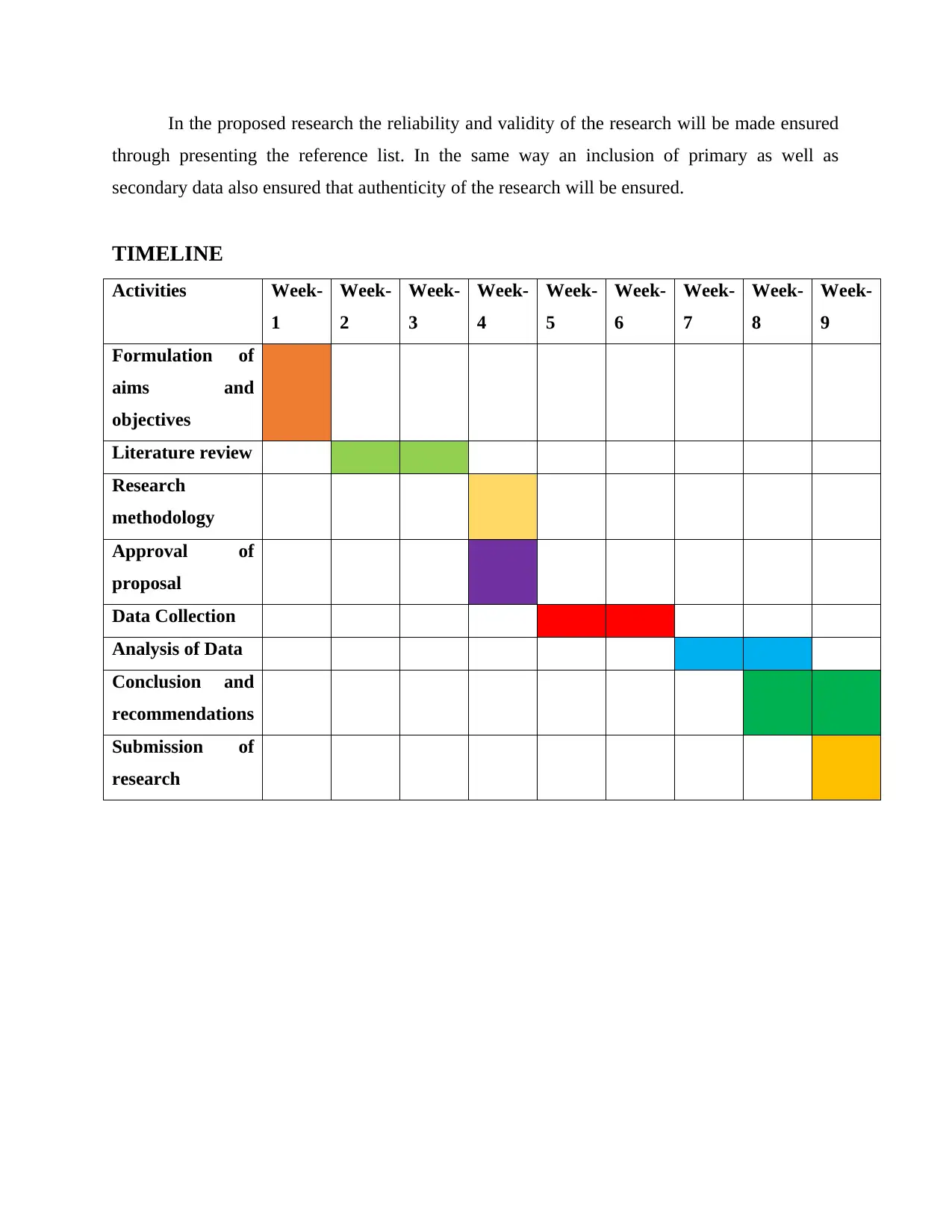
In the proposed research the reliability and validity of the research will be made ensured
through presenting the reference list. In the same way an inclusion of primary as well as
secondary data also ensured that authenticity of the research will be ensured.
TIMELINE
Activities Week-
1
Week-
2
Week-
3
Week-
4
Week-
5
Week-
6
Week-
7
Week-
8
Week-
9
Formulation of
aims and
objectives
Literature review
Research
methodology
Approval of
proposal
Data Collection
Analysis of Data
Conclusion and
recommendations
Submission of
research
through presenting the reference list. In the same way an inclusion of primary as well as
secondary data also ensured that authenticity of the research will be ensured.
TIMELINE
Activities Week-
1
Week-
2
Week-
3
Week-
4
Week-
5
Week-
6
Week-
7
Week-
8
Week-
9
Formulation of
aims and
objectives
Literature review
Research
methodology
Approval of
proposal
Data Collection
Analysis of Data
Conclusion and
recommendations
Submission of
research
Paraphrase This Document
Need a fresh take? Get an instant paraphrase of this document with our AI Paraphraser
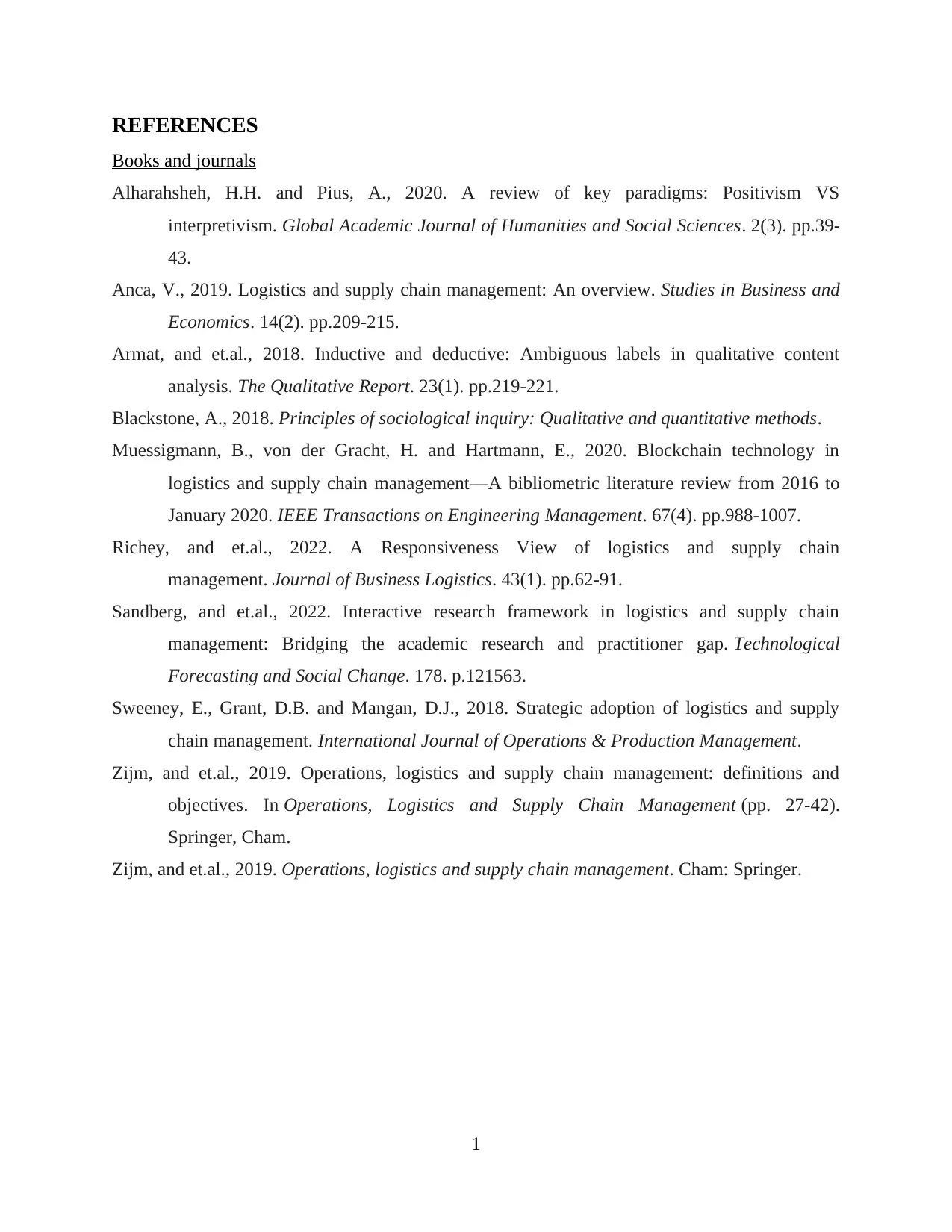
REFERENCES
Books and journals
Alharahsheh, H.H. and Pius, A., 2020. A review of key paradigms: Positivism VS
interpretivism. Global Academic Journal of Humanities and Social Sciences. 2(3). pp.39-
43.
Anca, V., 2019. Logistics and supply chain management: An overview. Studies in Business and
Economics. 14(2). pp.209-215.
Armat, and et.al., 2018. Inductive and deductive: Ambiguous labels in qualitative content
analysis. The Qualitative Report. 23(1). pp.219-221.
Blackstone, A., 2018. Principles of sociological inquiry: Qualitative and quantitative methods.
Muessigmann, B., von der Gracht, H. and Hartmann, E., 2020. Blockchain technology in
logistics and supply chain management—A bibliometric literature review from 2016 to
January 2020. IEEE Transactions on Engineering Management. 67(4). pp.988-1007.
Richey, and et.al., 2022. A Responsiveness View of logistics and supply chain
management. Journal of Business Logistics. 43(1). pp.62-91.
Sandberg, and et.al., 2022. Interactive research framework in logistics and supply chain
management: Bridging the academic research and practitioner gap. Technological
Forecasting and Social Change. 178. p.121563.
Sweeney, E., Grant, D.B. and Mangan, D.J., 2018. Strategic adoption of logistics and supply
chain management. International Journal of Operations & Production Management.
Zijm, and et.al., 2019. Operations, logistics and supply chain management: definitions and
objectives. In Operations, Logistics and Supply Chain Management (pp. 27-42).
Springer, Cham.
Zijm, and et.al., 2019. Operations, logistics and supply chain management. Cham: Springer.
1
Books and journals
Alharahsheh, H.H. and Pius, A., 2020. A review of key paradigms: Positivism VS
interpretivism. Global Academic Journal of Humanities and Social Sciences. 2(3). pp.39-
43.
Anca, V., 2019. Logistics and supply chain management: An overview. Studies in Business and
Economics. 14(2). pp.209-215.
Armat, and et.al., 2018. Inductive and deductive: Ambiguous labels in qualitative content
analysis. The Qualitative Report. 23(1). pp.219-221.
Blackstone, A., 2018. Principles of sociological inquiry: Qualitative and quantitative methods.
Muessigmann, B., von der Gracht, H. and Hartmann, E., 2020. Blockchain technology in
logistics and supply chain management—A bibliometric literature review from 2016 to
January 2020. IEEE Transactions on Engineering Management. 67(4). pp.988-1007.
Richey, and et.al., 2022. A Responsiveness View of logistics and supply chain
management. Journal of Business Logistics. 43(1). pp.62-91.
Sandberg, and et.al., 2022. Interactive research framework in logistics and supply chain
management: Bridging the academic research and practitioner gap. Technological
Forecasting and Social Change. 178. p.121563.
Sweeney, E., Grant, D.B. and Mangan, D.J., 2018. Strategic adoption of logistics and supply
chain management. International Journal of Operations & Production Management.
Zijm, and et.al., 2019. Operations, logistics and supply chain management: definitions and
objectives. In Operations, Logistics and Supply Chain Management (pp. 27-42).
Springer, Cham.
Zijm, and et.al., 2019. Operations, logistics and supply chain management. Cham: Springer.
1

2
⊘ This is a preview!⊘
Do you want full access?
Subscribe today to unlock all pages.

Trusted by 1+ million students worldwide
1 out of 9
Related Documents
Your All-in-One AI-Powered Toolkit for Academic Success.
+13062052269
info@desklib.com
Available 24*7 on WhatsApp / Email
![[object Object]](/_next/static/media/star-bottom.7253800d.svg)
Unlock your academic potential
Copyright © 2020–2025 A2Z Services. All Rights Reserved. Developed and managed by ZUCOL.





